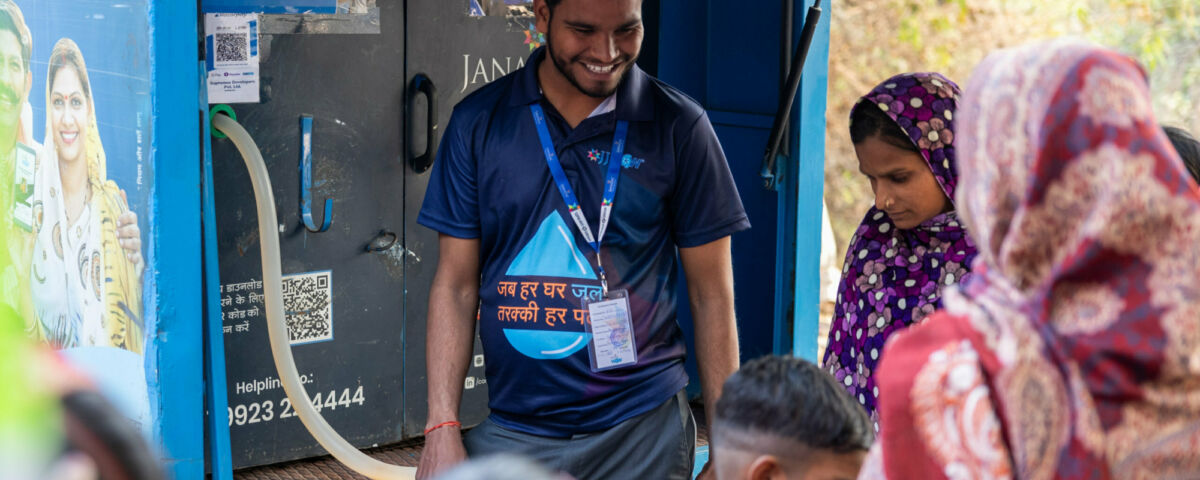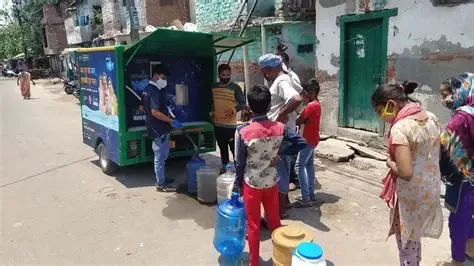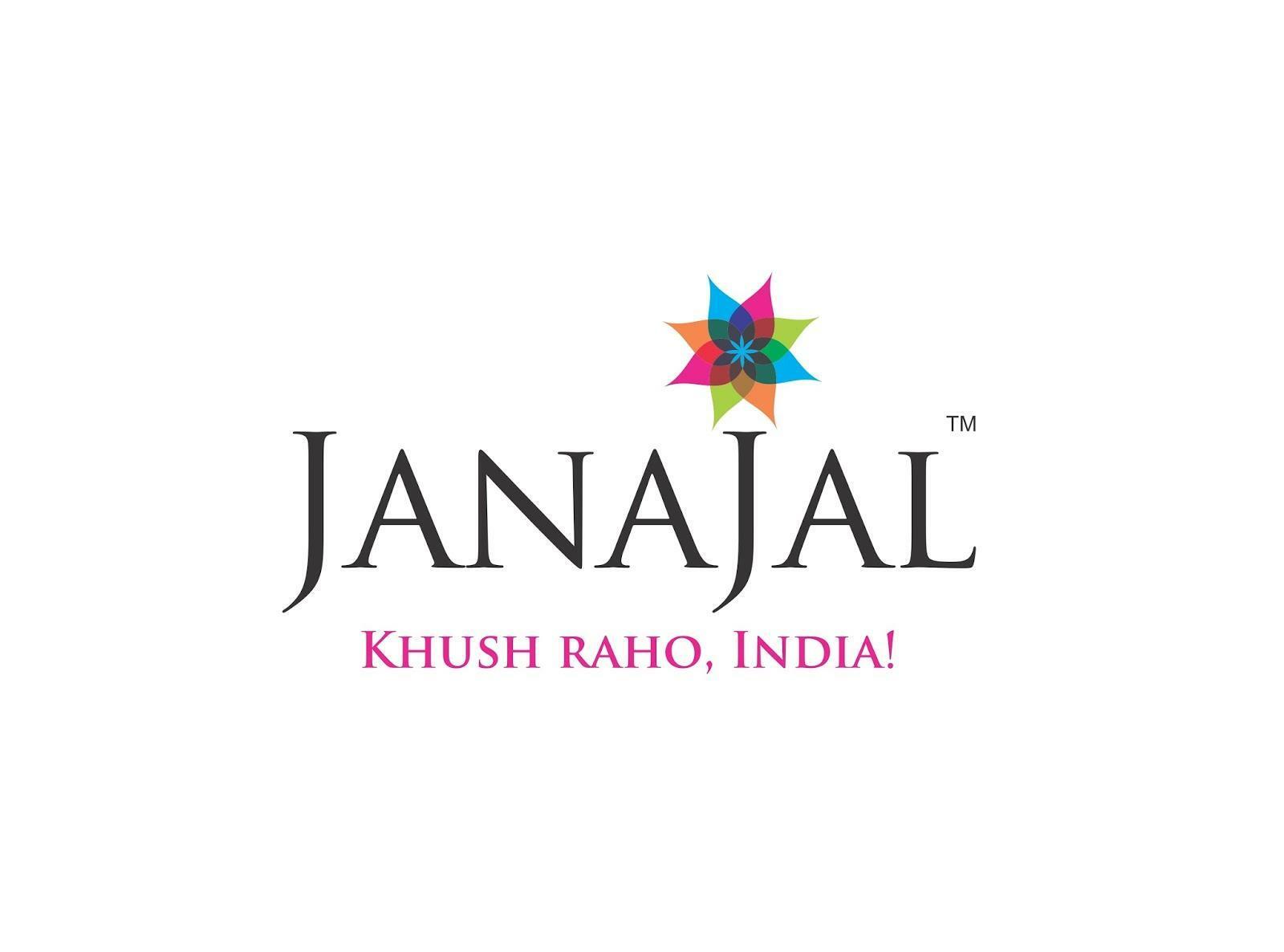




Keep this story going! Share below!
JanaJal WOW has created IoT-enabled, clean-fuel mobile water ATMs that deliver affordable, safe drinking water directly to underserved communities all over India.
JanaJal's primary innovation is the creation of a decentralized and technology-driven safe water delivery network, most notably embodied by their 'Water on Wheels' (WOW) initiative. JanaJal operates across India, bringing clean drinking water directly to underserved communities. The WOW system is a custom-designed, electric-powered, three-wheeled vehicle equipped with a water tank and a smart, IoT-enabled dispensing unit. This mobile water ATM navigates narrow lanes in slums and remote areas that lack piped water infrastructure. The process is simple: residents use a prepaid smart card to dispense the exact amount of water they need, ensuring affordability and minimizing waste. This model effectively bypasses the immense logistical and financial challenges of laying new pipelines, offering an immediate and scalable solution.
This innovative approach directly tackles several United Nations Sustainable Development Goals (UN SDGs), creating a better world by addressing fundamental needs. The most prominent is SDG 6: Clean Water and Sanitation. By providing access to safe and affordable drinking water, JanaJal drastically reduces the incidence of waterborne diseases, improving public health. Their work also supports SDG 3 (Good Health and Well-being) and SDG 11 (Sustainable Cities and Communities) by making urban and rural settlements safer and more inclusive. Furthermore, by using electric vehicles and discouraging single-use plastic bottles, the company contributes to SDG 13 (Climate Action) and SDG 12 (Responsible Consumption and Production). Through this hybrid model of fixed water ATMs and mobile WOW vehicles, JanaJal has created a holistic, sustainable ecosystem that provides a fundamental human right, empowers communities, and protects the environment.

"In that moment, I understood the profound difference between simply 'water' and 'safe water.' It became my life's mission to bridge that gap."
Dr. Agarwal's motivation stems from a deeply personal encounter. While traveling on a train in Pune, he met a mother and son who were visibly impoverished. He offered them his partially eaten food, which the mother politely declined out of custom. However, when he provided his partially consumed bottle of water, her response was immediate and desperate: she had no issue with it; she just needed safe water for her child.
"It was a startling revelation," Dr. Agarwal explained. "The desperation for safe water was so great that it overrode deep-seated cultural norms. I saw a market that had failed society, a market that was selling a basic necessity as a luxury item." This experience became the catalyst for JanaJal.
In India, a country that has made economic advancements, approximately 163 million individuals do not have access to safe drinking water. This shortfall results in rampant waterborne diseases, decreased productivity, and an unequal burden on women and children. While the market proposed costly bottled water as a solution for a select few, Dr. Parag Agarwal identified a systemic failure to protect a fundamental human right for the majority. In response, he established JanaJal ("People's Water"), a social enterprise with a transformative mission: to provide safe, purified water not for ₹20 per liter, but for only ₹5 for 20 liters. In an article published in Business Standard on October 25, 2023, it was stated that "The company has impacted over 26.5 million beneficiaries till date and dispensed over 150 million litres of safe water." Another article published in 2020 on YourStory platform highlighted that the initiative has helped create jobs, encouraged people to engage in social entrepreneurship activities, and provided vocational training to operators for maintaining water treatment plants. The overall effect of JanaJal is a beneficial cycle of health, economic, and social advantages, centered around SDG 6: Clean Water and Sanitation.
Short-term impact:
Long-term impact:
Through its scalable and innovative approach, JanaJal not only provides water but also offers health, opportunities, and dignity, demonstrating that a for-profit model can tackle one of humanity's most pressing challenges
Because JanaJal developed innovative, tech-driven solutions for safe water delivery, the business has unlocked significant growth, attracted investment, and expanded its social impact. By creating the 'Water on Wheels' (WOW) service, a custom-built, IoT-enabled electric vehicle that delivers safe water to underserved communities—JanaJal moved beyond static water ATMs. This new service, launched to tackle last-mile delivery challenges, directly opened new markets within slums and remote residential areas that were previously inaccessible. This innovation not only created a new revenue stream but also solidified the company's reputation as a pioneer in the water sector, directly leading to new investment opportunities.
This strategic pivot to mobile water delivery has yielded substantial benefits. The company's unique, sustainable model attracted a $5 million investment from US-based Tricolor Cleantech Capital, fueling further expansion and technological development. The growth in operations has necessitated hiring more employees, creating jobs for vehicle operators, technicians, and support staff, thereby contributing to local economies and community well-being. By developing and scaling this new service, JanaJal demonstrated a robust, scalable business case that marries social good with financial viability. This success has positioned them as an attractive partner for future investors and corporate social responsibility (CSR) initiatives, proving that their innovative approach is not just socially impactful but also a powerful engine for business growth.
JanaJal's innovations deliver profound benefits to both society and the environment by tackling critical issues of water safety, accessibility, and plastic pollution.
1. Societal and Health Impact
By deploying its 'Water on Wheels' (WOW) mobile ATMs and stationary water kiosks, JanaJal directly serves millions in underserved communities across India. This initiative provides families with consistent access to safe, affordable drinking water, drastically reducing their risk of waterborne diseases like cholera and typhoid. For society, this translates into improved public health, lower healthcare costs for impoverished families, and increased productivity as people spend less time being sick or searching for clean water. The model also fosters local entrepreneurship by creating jobs for operators and technicians, empowering communities from within and contributing to their economic well-being.
2. Environmental Benefits
The environmental impact is equally significant. A core benefit of JanaJal's model is the massive reduction in single-use plastic waste. By providing water through a dispensing system where people use their own reusable containers, the company has prevented hundreds of millions of plastic bottles from entering landfills and waterways. Furthermore, the use of electric vehicles for the 'Water on Wheels' service minimizes the carbon footprint associated with water distribution. This two-pronged approach—combating plastic pollution while using clean energy for transport—directly contributes to healthier ecosystems and more sustainable urban and rural environments.
Get stories of positive business innovations from around the world delivered right to your inbox.

JanaJal work to make safe water available and accessible to every citizen of the world in an affordable and equitable manner using sustainable practices in water treatment and delivery.